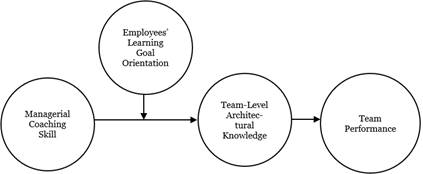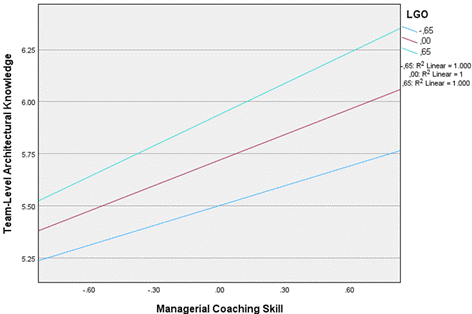Background to the Study
Coaching, as a developmental process, supports individuals in achieving personal or professional goals, reflecting a system aimed at enhancing individual contributions to a team [1]. This concept has evolved over the past two decades, with considerable research focusing on the manager-as-coach model, complementing the broader scope of external and internal organisational coaching [2]. In Indonesia's current management landscape, with its more horizontal hierarchy, the importance of coaching, particularly in training managers to adopt coaching techniques, is increasingly recognized. This approach aligns with the leadership trend of empowering employees, particularly relevant in organizations dominated by Generation Y and Z. These generations, characterized by a desire for workplace autonomy and self-improvement, respond well to management that promotes growth through learning, development and collaboration.
Mazars in Indonesia exemplifies the challenges and opportunities presented by this shift in managerial approach. The company has observed varied team performances, with some teams excelling and others struggling under pressure from workload and tight deadlines, leading to high employee turnover and potential long-term reputational damage. These issues are exacerbated during peak seasons, highlighting the need for effective managerial coaching to enhance team productivity and employee satisfaction. The company's strategic management has identified a potential link between team performance and managerial coaching skills, prompting a reevaluation of their approach to harnessing these skills for better organizational outcomes.
The investment in coaching programs is substantial, with organizations worldwide dedicating significant resources to gain competitive advantages ICF [3]. However, the risk of misallocating these resources towards ineffective managerial coaching initiatives is a concern, as highlighted by Nyfoudi et al. [4]. To address this issue and optimize coaching programs, there is a need for research that provides evidence-based insights and practical recommendations. The author's study at Mazars in Indonesia aims to fill this gap by exploring the relationship between managerial coaching skills and team effectiveness. This research seeks to offer solutions for optimizing coaching programs and fostering high-performing teams, focusing on the impact of these skills and contextual factors on team performance and productivity.
Objectives of the Study
The main objectives of this research are:
To examine the extent to which managerial coaching positively influences team effectiveness
To identify the fundamental mechanisms through which managerial coaching impacts team effectiveness
Examine the contextual factors mediating and moderating the relationship between managerial coaching skills and team effectiveness
Theoretical Review
Managerial coaching
Coaching has always been associated with sports [5]. Coaching has grown its branches in every field, including business, life and sport. Organisations today invest billions of dollars to gain the competitive benefits that coaching promises [3]. Some businesses take a pragmatic approach to coaching, attempting to centralise programs that assure coaching occurs [6]. Other organisations have no formal coaching program and rely on managers to coach employees. Regardless, a more in-depth glimpse at the history of managerial coaching was necessary to understand how managerial coaching impacts team effectiveness.
Coaching was popularised by Mace [7] in the management literature. Many studies have shown that coaching is a significant managerial tool for individual improvement and team performance, based on the works of Fournies [8] and Evered and Selman [9]. Prior research on managers as coaches has predominantly concentrated on three operationalizations of managerial coaching. One operationalization assesses the level at which a manager exhibits coaching behaviours, as demonstrated by Matsuo [10]. Other focuses on the extent to which managers lead by displaying a coaching style, as exemplified by Hui et al. [11]. A third operationalization examines managerial coaching as a team-level resource, specifically managers' competence in coaching efficacy, as studied by Dahling et al. [12] and Hagen and Aguilar [13]. This research would like to contribute to the study of the latter. While traditional managerial coaching is individual-focused, it is essential to conduct focused research on its impact on team potency as it is in team performance that drives organisational success [14].
While numerous worldwide studies have examined the relationship between managerial coaching and team effectiveness, it is still considered immature and lacks concrete insight. Minimal studies have been done on this topic in Indonesia.
Managerial Coaching Skill and Team-Level Architectural Knowledge
Ellinger and Bostrom [15] used the critical incident technique to indicate that managerial coaching behaviour as a facilitator of learning may be separated into two types: Empowering and facilitating. Giving employees more power and authority by pushing them to take more personal responsibility and accountability for their actions and decisions is what "empowering behaviour" means. "Facilitating behavior" promotes enhanced comprehension and perspectives, while offering guidance and assistance to staff in order to aid learning and growth. In a similar vein, Heslin et al. [16] devised a managerial coaching assessment with three key factors: facilitation (helping employees analyze and explore solutions to problems and enhance their performance), guidance (communicating explicit performance expectations and providing constructive feedback on performance outcomes and ways to improve) and inspiration (encouraging employees to recognize and cultivate their potential). Hui et al. [17] differentiated "facilitation coaching" (assisting employees in exploring and evaluating the task, as well as self-developing the necessary replies for better performance) from "guidance coaching" (delivering clear expectations and prescriptive comments on how to improve). According to this research, managerial coaching encourages subordinates to reflect, provides feedback to enhance their performance and stimulates them to accept challenges [10].
Mathieu et al. [18] say that teams are essential for organisations that work well. So, learning and development needs have changed from focusing only on the person to helping the team as a whole learn and grow in the context of its functions to make the team more effective [9]. Much research has been done on the effectiveness of different team-focused learning and development strategies, with team coaching being the most recent in the framework of architectural knowledge. Architectural Knowledge in the context of software engineering and system design refers to the understanding and documentation of the fundamental structural choices critical to system design. Architectural knowledge encompasses the software systems' structures, including elements, their relationships and the principles and guidelines governing their design and evolution over time [20].
This knowledge is not limited to the architecture of individual software systems but extends to the architecture of the overall software ecosystem and its interdependencies within a business context. Nyfoudi et al. [4] say that team-level architectural knowledge is a body of situated knowledge about work processes, roles and dynamics.
Employees’ Learning Goal Orientation
Learning Goal Orientation describes an individual's disposition towards developing competencies and acquiring new skills in a learning situation [21]. It is a dimension of goal orientation theory, which posits that individuals are motivated by mastery of tasks or demonstration of competence [22]. Dweck [21] introduced the concept of goal orientation, distinguishing between performance and learning orientations. VandeWalle [23] refined this by suggesting a three-factor model comprising learning, performance-prove and performance-avoid orientations.
Button et al. [24] found that individuals with a high learning goal orientation are more likely to seek feedback and demonstrate higher adaptability in challenging tasks. Similarly, Payne et al. [25] observed that learning goal orientation positively correlates with self-efficacy and intrinsic motivation, leading to better performance outcomes.
Janssen and Van Yperen [26] demonstrated that learning goal orientation enhances employee creativity, suggesting that a learning orientation fosters an open-minded approach to problem-solving. Meanwhile, Porath and Bateman [27] linked learning goal orientation to increased job satisfaction and overall well-being, indicating a broader impact on employee attitudes.
Organisations that foster a culture of learning and development can enhance learning goal orientation among employees. Gong et al. [28] noted that supportive leadership and an emphasis on continuous learning are critical for cultivating learning goal orientation. This is echoed by Noe et al. [29], who highlighted the role of organisational learning culture in promoting learning goal orientation.
Managerial Coaching Skill and Team Performance
Team performance is defined as the quality, quantity and timeliness of work completed as a team, as well as the cooperation of team members [30]. It has been found to be a significant outcome of team-related development [31]. Hackman [32] states that team effectiveness can be defined in terms of output, social process and learning. Hackman [33] also says that a study has shown there are five conditions that optimise team effectiveness and these are: real team, compelling direction, enabling structure, social support and coaching.
Managerial coaching is an essential leadership skill that facilitates employee development and team success [34]. It involves guiding, encouraging and supporting team members towards achieving organisational goals. Hamlin et al. [35] proposed that effective managerial coaching consists of a combination of skills and attributes, including empathy, patience and the ability to provide constructive feedback. These capabilities foster a positive work environment and enhance team performance. Ellinger et al. [36] found that managerial coaching leads to improved job performance, employee commitment and satisfaction. Agarwal et al. [37] observed a positive correlation between managerial coaching and team innovation, suggesting that coaching enhances creative thinking and problem-solving. Gregory and Levy [38] demonstrated that coaching by managers significantly impacts employees' perceptions of organisational support, thereby increasing their engagement and productivity.
Similarly, Ladyshewsky [39] linked managerial coaching to improved interpersonal relations and team dynamics. Joo [40] emphasised the role of coaching in developing a learning-oriented culture, which positively affects team performance. Meanwhile, Kim et al. [41] highlighted that coaching skills are particularly effective in environments where teamwork and collaboration are crucial.
Organisations seeking to enhance team performance should invest in developing their managers' coaching skills. Orth et al. [42] suggested that training programs focusing on communication, feedback and motivational skills are beneficial. This is supported by McLeod [43], who argued for the integration of coaching skills into leadership development initiatives.
Research Hypotheses
Following the comprehensive literature review that highlights the significant impact of managerial coaching skills on team performance, it becomes apparent that there is a need to explore further and empirically test the dynamics of this relationship:
H1: The managerial coaching skill has a significant positive impact on team-level architectural knowledge
H2: The employees’ learning goal orientation moderates the significant positive impact of managerial on team-level architectural knowledge. The effect is stronger if the learning goal orientation is high and weaker if the learning goal orientation is low
H3: The employees' learning goal orientation moderates the impact of managerial coaching skill on team performance, mediated by team-level architectural knowledge. Specifically, the relationship is more pronounced when employees have a higher learning goal orientation than a low one
Conceptual Framework
The conceptual model that comprised this study's framework was a modified adaptation of the model proposed by Nyfoudi et al. [4] and this is presented in Figure 1.

Figure 1: Conceptual Framework
Note: This conceptual framework was a modified adaptation from Nyfoudi et al. [4]
Nyfoudi et al. [4] proposed that the relationship between managerial coaching skill and team performance mediated by team-level architectural knowledge is likely stronger when the manager’s learning goal orientation is high and weaker when manager’s learning goal orientation is low. The author modified this by taking into account the learning goal orientation of both managers and team members. Hence, in the context of employees rather than on manager side alone.





